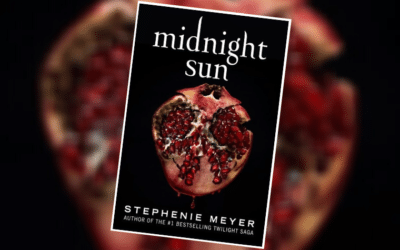The tears. The pain. The weight gain due to drowning your feelings in a pint of Ben and Jerry’s Half Baked.
Nothing is worse than that feeling of getting your heart ripped out due to a breakup…with a book series.
Many passionate readers are more than familiar with this scenario: you meet that first book. There’s a spark, an instantaneous connection. You feel that it has been written just for you. Next thing you know, you’re at the end of the first book and rushing to your bookstore to purchase the next one. (And that is why you need an ereader, folks. You can purchase from the comfort of your home! Hello, technology! Goodbye, putting on a bra!)
But then something changes. Paths diverge. Directions start to separate. The chasm between page and reader grows bigger. And in a turn of a page (Book pun!), you’re not in that big of a rush to get the new book. You find yourself saying to it, “It’s not you. It’s me. You deserve so much more than what I can provide.” You start quoting Adele songs to express your feelings.
There could a number of reasons for this breakup: lack of character development, recycled plot lines, TV/film adaptations that – gasp – turned out better than the book.
But nevertheless, when you have a book breakup, it could be a little gut wrenching. Before you write endless slam poetry of your emotions and create a shrine to the series you loved and lost, here are the stages of grief for a breakup with a book series.
 Bella understands what it feels like.
Bella understands what it feels like.
Stage 1: Desperation
This is the stage where rational thought is sooooo blasé.
You notice your favorite series is starting to slip, spiral out of your control. (As if you had any!)
Desperate to get back what you once had, you seek outside help. Yep, you tweet/message/email the author.
Somewhere in your brain, you said to yourself, “Brilliant! He/She will take my advice, see what a loving and caring fan I am, and make the changes. All will be right in the literary world. And then, we will be best friends, and I’ll get free advanced copies of future releases and maybe, just maybe a shout out in the acknowledgements that hardly anyone reads.”
You poor, sweet, sad bae. Go ahead, send that email. I have the tissues ready.
Stage 2: Denial
This is just a hiccup. A speed bump. Everything will be back to normal in book ___. I blame the economy/global warming/Russia/the man. This probably wasn’t ready to go to print.
Aw, the denial stage. A refusal to accept what has happened. Postponing the inevitable break up.
In this stage, you go back to the early books – what you come to think of as the good years – stare at the covers, reread your favorite moments, know that the series is capable of so much more but refuses to see its potential. It’s just being scared, vulnerable, shy. All it needs is a reader like you to open its eyes.
Stage 3: Anger
If denial is the calm before the storm, this phase is the mother of shit storms.
Think of every cliche that describes anger. Yep, that’s you at this point.
You go on fan sites, air your grievances and practically start a literary civil war. Give 1 star reviews on Amazon and say something cliche like, “If only I could have given it zero stars.” You write endless fanfiction with the disclaimer, “How the story should really go.”
Essentially, you rage against the literary machine. And sometimes, it’s not pretty.
Stage 4: Relapse
Picture it: the next book in a series you have sworn off for all eternity is coming out. You tell yourself you won’t fall for it this time. You’ve moved on to other books, better books who understand you and give you what you need.
But the pull is strong, so you do what we’ve all done in the past to many exes: you spy. (Why else was FaceBook created?)
You peruse the new book’s Amazon page (Under a pseudonym of course!), read a few reviews, see a few four and even five star reviews. Some reviews even claim that wayward former diehard fans of the series will want to come back for this book. (That’s you!)
Every “Recommended for You” page lists the book. See, you tell yourself, reconciliation is just a purchase away!
So, you make the jump, buy the book, your hopes are high…and you realize nothing has changed.
Same plot, same characters, same reader.
 Someone is NEVER reading recommendations again!
Someone is NEVER reading recommendations again!
And just like that, you’re writing your vitriolic review on Amazon. Take that, five star reviewers!
Stage 5: Acceptance
And here it is: the stage of bittersweet acceptance that the series will never be what it once was for you. The time to let go, move on, and continue forward.
You start to realize that it wasn’t the series that’s changed; it’s you as a reader. You wanted something more, something different; and at this point, the series can’t give you that. And all those emails you sent the author, the reviews you posted, the fan fiction you composed? That wasn’t for the series in the hopes that everything would change. That was for you. It was your beautiful way of saying goodbye.
(Please take note: I don’t think all fan fiction is an act of saying goodbye or even responding to the feeling that writer didn’t do the original story justice. But for some people, it’s their swan song.)
So, don’t look at this stage as an act of defeat or giving up. (No matter what anyone in any fandom puts down on some list of concocted rules of behavior.) Think of this as your way of finally acknowledging what you have been denying: you and the series are parting ways, and it’s going to be okay.
Here’s a tissue. I’ll grab the Ben & Jerry’s.
Stage 6: Growth
Time heals all wounds. Especially paper cuts to the heart. (Boom! Another book pun!)
Days turn into weeks, months, a year. In that time, you find other books – some great, others not so much. Other characters, plots, authors consume your time. And before you know it, you haven’t really thought about that one series that broke your reader heart. In fact, your heart feels mended.
Then one day, someone asks you for a book recommendation, and you think of this one amazing series that had a few bumps and snags but was overall a great adventure. And so, you give your recommendation in the hopes that the series finds a new fan, someone who will fall in love with it the way you did but maybe find something you didn’t.
And that’s what’s great about books: it’s completely subjective. I have loved books others have hated and bashed. And I have hated books that others completely love.
So, don’t let your heartbreak besmirch your recommendation. Who knows? Maybe that person will find something amazing about the books and open your eyes.
What are some great books that made your literary heart heal or gave you a literary heartbreak? Let us know what books healed your reader heart!




